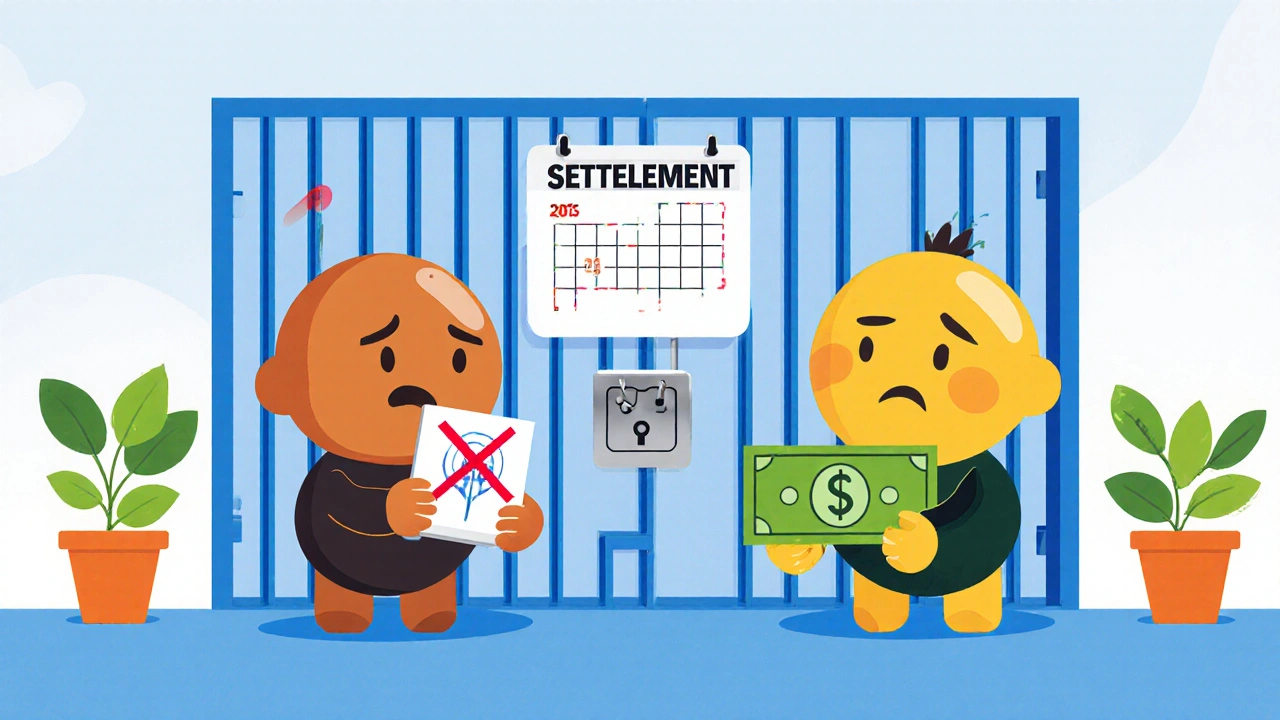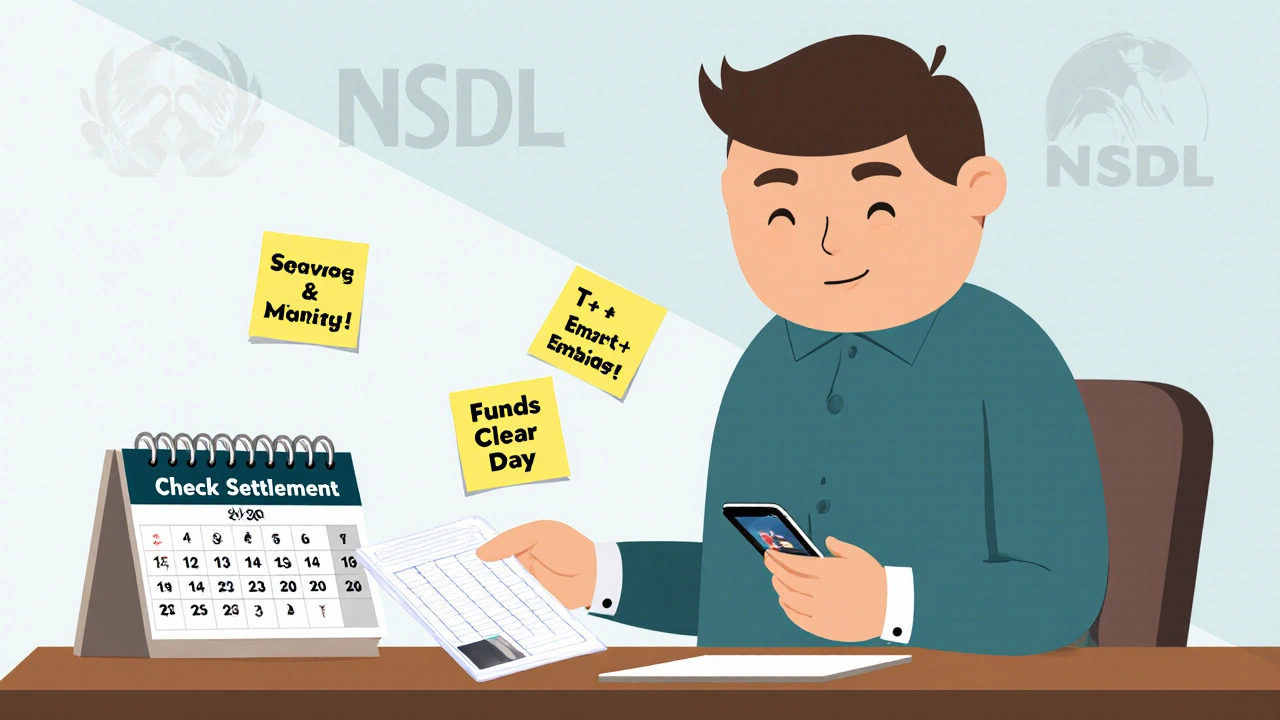Settlement Holidays and Trading Holidays in India: How They Affect Your Trades
When you place a trade in India, you might think it’s done the moment you click ‘buy’ or ‘sell.’ But behind the scenes, a quiet clock is ticking-one that stops on holidays you never see on your screen. Settlement holidays and trading holidays in India don’t just mean a day off for brokers. They directly delay your money, lock your positions, and can turn a simple trade into a costly mistake if you’re not prepared.
What’s the Difference Between Trading Holidays and Settlement Holidays?
Trading holidays are days when the stock exchanges-NSE and BSE-are closed. No buying, no selling. Simple. You’ll see these on your broker’s app: Republic Day, Diwali, Eid, Christmas. Easy to remember.
Settlement holidays are trickier. The exchanges might be open, but the clearing houses and banks that move money and shares between accounts are shut. That means even if you buy shares on a regular trading day, you won’t get them in your demat account until the next settlement day. Same goes for cash: if you sell, you won’t get paid until settlement clears.
Think of it like this: trading is ordering a pizza. Settlement is the delivery. You can order on a Sunday, but if the delivery guy’s off, your pizza waits. In India, settlement cycles are T+1-meaning trades settle one business day after execution. But if that next day is a settlement holiday? Your trade gets pushed to the day after that.
How Settlement Holidays Delay Your Money and Shares
Let’s say you sell 100 shares of Reliance Industries on Friday, September 20, 2025. Normally, you’d get the cash in your bank account by Monday, September 23. But what if Monday is a settlement holiday? The banks and NSDL/CDSL are closed. So your money doesn’t move until Tuesday, September 24. That’s a two-day delay. For day traders or those relying on quick cash flow, that’s a problem.
Same thing happens with shares. If you buy on a day before a settlement holiday, you won’t see the shares in your demat account until after the holiday clears. You can’t sell them until they’re credited. So if you’re trying to scalp a quick gain and the shares don’t show up? You’re stuck.
Real example: In 2024, Diwali fell on a Wednesday. The NSE was open that day, but settlement was delayed because banks were closed for the festival. Traders who bought stocks on Diwali morning didn’t get their shares until Friday. Many missed their planned exit because they assumed the shares were in their account.
Why You Can’t Ignore the Settlement Calendar
Most retail investors only check the trading calendar. That’s like only checking flight times and forgetting about baggage claim delays. Settlement holidays are just as critical.
Here’s what happens when you ignore them:
- You think you’re liquid and try to buy more stocks-only to find your funds haven’t cleared.
- You plan to exit a position on a specific date, but settlement delays push it back, and the price moves against you.
- You get margin calls because your collateral (shares you thought you owned) isn’t yet credited.
- You accidentally trigger a short-selling violation because your sold shares haven’t been delivered yet.
Brokers don’t warn you about settlement holidays in real-time. You have to check them yourself. The National Securities Depository Limited (NSDL) and Central Depository Services (India) Limited (CDSL) publish the official settlement holiday list every year. NSE and BSE also list them on their websites under ‘Market Holidays.’

2025 Settlement and Trading Holiday Calendar for India
Here’s what you need to watch for in 2025:
| Date | Day | Trading Holiday? | Settlement Holiday? | Reason |
|---|---|---|---|---|
| January 26, 2025 | Sunday | Yes | Yes | Republic Day |
| March 17, 2025 | Monday | Yes | Yes | Holi |
| April 14, 2025 | Monday | Yes | Yes | Good Friday |
| May 1, 2025 | Thursday | Yes | Yes | Labour Day |
| August 15, 2025 | Friday | Yes | Yes | Independence Day |
| October 2, 2025 | Thursday | Yes | Yes | Gandhi Jayanti |
| October 28, 2025 | Tuesday | No | Yes | Diwali Laxmi Pujan (Settlement only) |
| November 1, 2025 | Saturday | No | Yes | Id-ul-Zuha (Bakrid) - Settlement only |
| December 25, 2025 | Thursday | Yes | Yes | Christmas |
Notice the two days in October and November? The markets were open, but settlement was delayed. That’s where most traders get caught. You can trade, but you can’t move money or shares. If you’re not checking the settlement calendar, you’re flying blind.
How to Avoid Getting Trapped by Holiday Delays
Here’s how to stay ahead:
- Bookmark the official calendars. Go to nseindia.com and bseindia.com. Look for ‘Market Holidays’ under the ‘About Us’ or ‘Market Info’ section. Download the PDFs.
- Sync your calendar. Add both trading and settlement holidays to your Google Calendar or phone calendar. Label them clearly: ‘Settlement Holiday - No Funds Clearing’.
- Plan trades around settlement dates. If you need cash by Friday, don’t sell on Wednesday if Thursday is a settlement holiday. Sell on Tuesday instead.
- Don’t assume T+1 means ‘next day.’ It means ‘next business day.’ If the next day is a holiday, it’s T+2 or T+3.
- Use your broker’s alerts. Most brokers now send SMS or app notifications for settlement delays. Turn them on.
Pro tip: If you’re swing trading and holding positions over weekends, always check if the following Monday is a settlement holiday. That’s when delays hit hardest.
What Happens to Your Options and Futures?
Derivatives like options and futures have their own rules. Expiry days can fall on holidays. If the last trading day is a holiday, the exchange moves it to the previous day. But settlement for those contracts still follows the banking calendar. So even if you close your position on time, you might not get your profit until the next settlement day.
In 2024, Nifty options expired on a Friday that was also a settlement holiday. Traders who closed positions got the profit in their accounts on Monday, not Friday. Some missed their next trade because they thought the cash was available.

Why This Matters More Than You Think
It’s not just about patience. It’s about risk. Delayed settlements can break your strategy. If you’re using leverage, a delayed credit can trigger a margin call. If you’re using automated bots, they might try to trade with funds that aren’t settled-and get rejected, costing you fees or missed opportunities.
Even long-term investors aren’t safe. If you’re reinvesting dividends and the dividend payout date falls on a settlement holiday, you won’t get the cash to buy more shares until the next business day. That’s a missed compounding window.
India’s market is growing fast. More people are trading. More bots are active. But the infrastructure hasn’t changed much. Settlement still runs on a 1990s banking system. You can’t fix that. But you can plan for it.
What to Do If You Get Caught in a Delay
Accidentally sold shares and can’t buy back because your cash hasn’t cleared? Don’t panic. Don’t try to force a trade with unsettled funds. That’s when you get penalized.
Instead:
- Check your broker’s platform for ‘Settlement Status’ or ‘Funds Available’.
- Wait. The system will auto-correct. You’ll get the cash by end of day on the next settlement day.
- If you’re in a hurry, contact your broker’s support. They can confirm the exact settlement date.
- Never use unsettled funds to buy new shares. You’ll get a ‘bad delivery’ or ‘margin violation’ notice.
One trader I know lost ₹12,000 in penalties in 2023 because he tried to buy shares with funds that were still settling. He thought his account balance was his available cash. It wasn’t. He learned the hard way.
Final Tip: Build a Holiday Checklist
Every January, take 15 minutes to:
- Download the latest NSE and BSE holiday list.
- Highlight all settlement holidays-even if markets are open.
- Block them in your calendar.
- Set a reminder: ‘Check settlement status before placing trades 2 days before any holiday.’
That’s it. No apps needed. No fancy tools. Just awareness. The market doesn’t care if you’re busy. It runs on its own schedule. If you want to trade smart in India, you have to match its rhythm-not your assumptions.
Are settlement holidays the same as trading holidays in India?
No. Trading holidays are days when the stock exchanges (NSE, BSE) are closed for trading. Settlement holidays are days when banks and depositories (NSDL, CDSL) are closed, so even if markets are open, money and shares can’t move. You can trade on a settlement holiday, but your trade won’t settle until the next business day.
What happens if I sell shares on a settlement holiday?
You can’t sell on a settlement holiday because the exchanges are closed. Settlement holidays only affect the clearing of trades made on previous trading days. If you sell on Friday and Monday is a settlement holiday, you’ll get your cash on Tuesday.
Can I buy shares on a settlement holiday?
Yes, if the exchange is open. But the shares won’t appear in your demat account until after the next settlement day. If you buy on a settlement holiday and try to sell the same day, your trade will fail because the shares aren’t credited yet.
Where can I find the official list of settlement holidays in India?
Visit the official websites of the National Stock Exchange (nseindia.com) or Bombay Stock Exchange (bseindia.com). Go to ‘Market Info’ or ‘About Us’ and look for ‘Market Holidays.’ Both sites publish downloadable PDFs of the full calendar, including settlement-only holidays.
Do mutual funds and SIPs get affected by settlement holidays?
Yes. If you invest in mutual funds via SIP, and the payment date falls on a settlement holiday, the bank won’t process the debit until the next business day. Your SIP might be delayed, but it won’t be canceled. Your fund house will usually auto-reschedule it for the next day. Check your fund house’s policy.
Why do settlement holidays exist in India?
Settlement holidays exist because India’s financial infrastructure still relies on traditional banking systems and manual processes for clearing and settlement. Unlike markets in the U.S. or Europe, where settlement happens electronically 24/7, Indian banks and depositories close on public holidays, which delays the movement of cash and shares. This is slowly changing, but for now, it’s a key part of trading in India.





